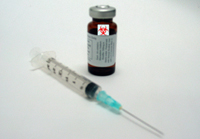From the Kitchen #24
 What does one do when one sees an activity that has become a trend that can easily lead to horrible outcomes? Especially when there are examples of just that happening?
What does one do when one sees an activity that has become a trend that can easily lead to horrible outcomes? Especially when there are examples of just that happening?
One can write to one’s Member of Parliament and Senators. One can write letters to newspapers. One can call talk-back radio. One can write a blog. But, before going public with details, one had better be sure of one’s facts.
As regular readers of this column will know, I can get righteously angry about things, and this is one of them.
Something Australia can be proud of is the standard of regulation of pharmaceutical products, as administered by the TGA (Therapeutic Goods Administration). The TGA works to try and ensure the purity and safety of our medicines, including ‘natural’ or ‘complementary’ medicines such as vitamin and herbal supplements. On the whole, it all works well and the Australian experience is respected overseas.
When this national system was brought in, in 1989, the intention was that it would be truly national and cover the field. Despite the good intentions, it has failed in this. Each of the six States was to pass complementary legislation to give effect to the national scheme, but only three have done so to date. This means that within the other States (Western Australia, South Australia and Queensland) manufacturers need only comply with local laws, unless they want to sell across State borders. In many ways the State laws are less rigorous than the national ones.
The other problem with the national scheme is that it allowed specific exemptions. The improper exploitation of some of these exemptions causes my ire: there is an exemption for retail pharmacists making medicines in their pharmacies; this is referred to as extemporaneous compounding. If pharmacists stuck to the intent of the exemption and even to the letter of it, there would be little for me to complain about.
To understand what pharmacists are exempt from, I need to explain what everyone else has to comply with. Basically, manufacturers of medicines have to go through a rigorous registration or listing process for each medicine and each variation of its formulation, dosage and packaging. They also have to have their manufacturing premises designed and built to very stringent standards and, to be and remain licensed, the premises are frequently inspected by the TGA (as are procedures, documentation, etc.).
The exemption for pharmacists was designed to allow them to make small quantities of medicines in circumstances where those medicines were not commercially available or were not available, say, in a country town, or there was an emergency need for them. They are to be compounded in a limited supply for a specific patient on a doctor’s prescription. Thus, it is common for pharmacists to make up hormone preparations which are specifically tailored for each patient. What has been developing and is now common, is that a number of pharmacists have set up larger manufacturing outfits in which they produce large batches of medicines, including injectable vitamins, and sell them commercially, usually directly to doctors. These premises are not inspected or licensed by the TGA and would not be of a standard that they could be licensed.
It is fortunate that we have not had any deaths in Australia as a result of substandard, compounded medicines. Not so in the USA, and this is why my anger is leading me to consider embarking on some thorough research into the finer details. I recently came across an injectable vitamin manufactured by a very large compounding pharmacy in the USA. That company has a number of times made mistakes in its manufacture, leading to deaths. One mistake amounted to producing a medicine with ten times the stated active ingredient. The company has been prosecuted a number of times by the FDA (the USA equivalent to our TGA) and has on each occasion paid a large fine in a settlement arrangement. There is also a class action against it by relatives of people who have died as a result of the ‘mistakes’. Yet the company is still operating as normal and is selling its products overseas.
The label on the vial of injectable vitamin I have in front of me has two contradictory statements on it about the contents and a warning: “For office use only”. Office use?
With the burgeoning trend of Australian doctors injecting their patients with substances whose purity, composition and sterility cannot be guaranteed, it is only a matter of time before someone dies as a result. The Australian Government needs to do everything it can to prevent this.
© 2009 Daan Spijer
PS. I need to declare that I do part-time paid work for a company in Melbourne which manufactures TGA-registered nutritional supplements and other medicines and that until 30 June 2007 I was CEO of the Australasian College of Nutritional & Environmental Medicine.
[to receive an email each time a new piece is posted, email me: <daan dot spijer at gmail dot com>]
 CLICK HERE to download a formatted PDF of the above post
CLICK HERE to download a formatted PDF of the above post
 See more of Daan Spijer’s writing and his photos at Seventh House Communications
See more of Daan Spijer’s writing and his photos at Seventh House Communications
Very clear, clean and to the point.
Thank you. Nice to hear.
I am fully agreeable with your comments. Although chemists are ones just failing their doctorship, they know enough about medicine to make up certain scripts prescribed by a doctor. I have had a cream made up(doctor’s consent). I have had a cold remedy made up. As far as a more serious medication, chemists should leave that to the registered medications.